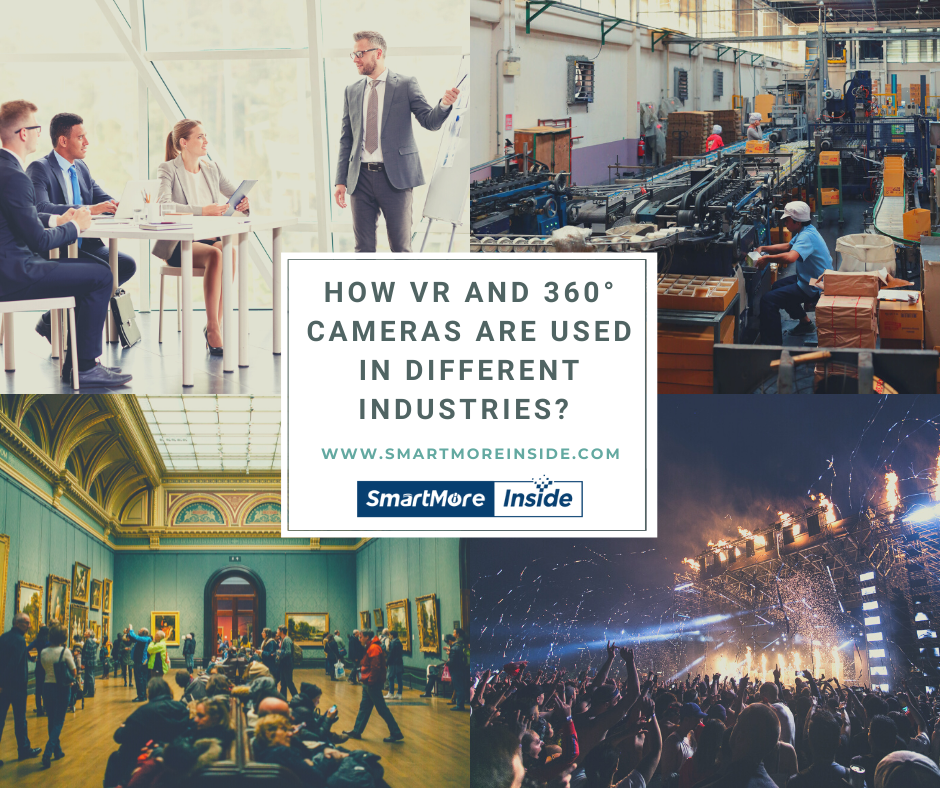

Introduction
VR is the term used to describe a computer-generated environment that someone can explore and interact with. 360° cameras can produce photos and videos that can be viewed in a virtual reality headset. A user with a 360° camera and VR headset can be immersed in the environment and the brain is basically tricked into thinking what someone is seeing in the virtual world is real. 360 VR focuses on the real world rather than computer generated imagery. That’s why 360° cameras and VR applications are adopted in different industries.

Media & Entertainment
Media & Entertainment is an important application where VR and 360° cameras can have a significant impact. Companies such as Cosm Immersive enable broadcasters and e-sports teams to deliver live content on mobile VR. Several VR companies are also specialising in watching live sports events, including NBA, NFL, and other events in VR.
VR and 360° cameras can be used to bring conference attendance to participate in in-person events, while event-industries are also using it to drive collective experiences among in-person audiences. Compared to other types of immersive content, live event streaming is considered to be a huge area for potential growth in the VR industry.
Education & Training
VR technology brings the revolution of education. It enables students to learn in an immersive interactive and experiential way. RobotLAB‘s VR Expeditions 2.0, in partnership with Encyclopedia Britannica and 360 cities, are available for all educators. The virtual field trips bring the beautiful world into the classrooms, to demonstrate our historical, cultural and diversity of our world.
Enterprise can also make use of the 360° cameras and VR technologies to create and simulate different lifelike scenarios inside the virtual training environments for professional users. It is effective for teaching hard skills and providing on-job skills simulations. VR training prepares and upskill employees in an affordable way and drives better results.
Manufacturing
The PwC research shows that more than one-third of the US manufacturers are going to adopt the AR and VR technologies by the end of 2018. Thanks to VR, manufacturers can make use of a 360° Camera to create a VR video of the equipment and inspect it remotely with no need of inviting the expert. When the time and costs of travel are reduced, the inspections and remote maintenance can be done in virtual reality much faster and reduce the interruptions in the production cycle.
Tourism
With the development in VR, it provides a new way of traveling experience to engage with the customers. 360° cameras can be used to capture tourism destinations in a unique and immersive format. The tourists are able to create a better experience of their travel and preview the attractions in advance. The industry has been taking steps to enable visitors to go on guided virtual tours of different tourist attractions in 360 degree, including zoos, museums, and historical sites.
Conclusion
With a 360° camera integrated with SmartMore advanced algorithms, you can completely focus on creating great content for VR. Our 8K 360° camera can capture high quality video up to 8K quality and support 4K live streaming on different social media platforms with just one-click. The pocket size camera is also waterproof with IP65 rating. Perfect for various uses under different environments.
Email format error
Email cannot be empty
Email already exists
6-20 characters(letters plus numbers only)
The password is inconsistent
Email format error
Email cannot be empty
Email does not exist
6-20 characters(letters plus numbers only)
The password is inconsistent